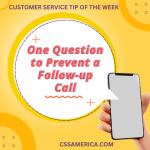
I’m sure if we asked every healthcare CEO, every university president, and every sports team COO whether his/her staff are responsive to their current or prospective customers, they’d say “Yes!” And they’d be horrified to hear the truth.
We’ve conducted thousands of mystery shops in public and private sector businesses – from your local school system to pro sports teams, from universities to banks, from municipalities to healthcare providers. Oftentimes we leave voice mails and e-mails requesting a response to a question or need. Almost invariably, the response rates to those messages are abysmal.
The best return call percentage to voice mails has been 55%. The best e-mail response rate we’ve seen is 64%. I’m not describing high quality responses, either; I’m just sharing the percentage who responded at all.
Maybe I give the CXOs too much credit, suggesting they’d be “horrified.” Why? Because it’s not like moving mountains to have personnel respond to over 70% or 80% or 90% of messages received. Three actions of the CXOs are required to increase responsiveness:
- They have to continually communicate how important it is to be responsive to customers.
- The CXOs must be as responsive to their own staff as they expect staff to be with customers.
- The CXOs must ensure that their management and staff have the time, processes, and systems that facilitate responsiveness.
Now one could surmise that the 3rd point is the hardest action to take, and that may be true. But I would argue that the 2nd point is hardest for most CXOs, because even before these actions occur, the CXO has to do one simple thing – care.
They have to care about staff, care about the customer, care about creating an environment where responsiveness can occur, and care about being the model to their staff.
So what’s the best way to ensure that staff “get it” about the need for responsiveness?
To answer this, I’m going to steal a line a client of mine stated last week (I’m paraphrasing). Leaders should ask their staff “Who’s the most responsive person in the organization?”
What if the staff named that leader, that CXO? Now, that would be POWERFUL!
Share this Tip with your leaders. Encourage them to be the most responsive person in your organization.
Signup for FREE Tips! Contact Us More Resources for You Visit Our Home Page























